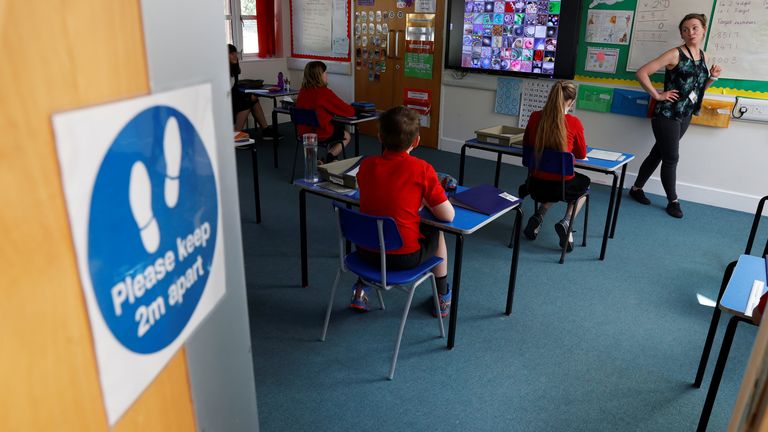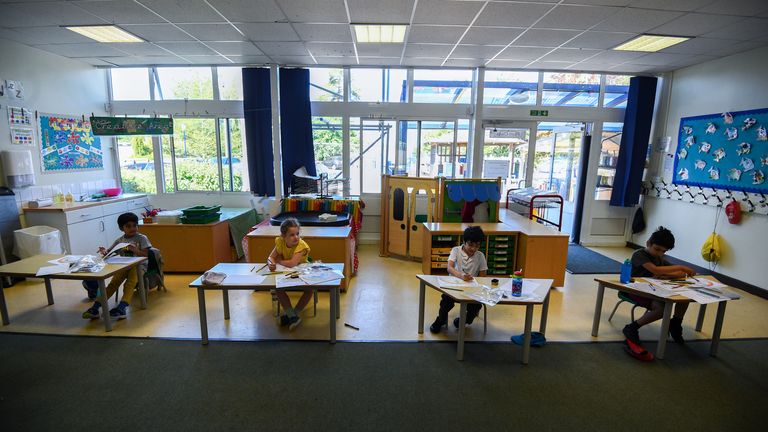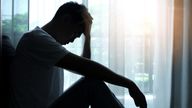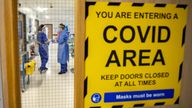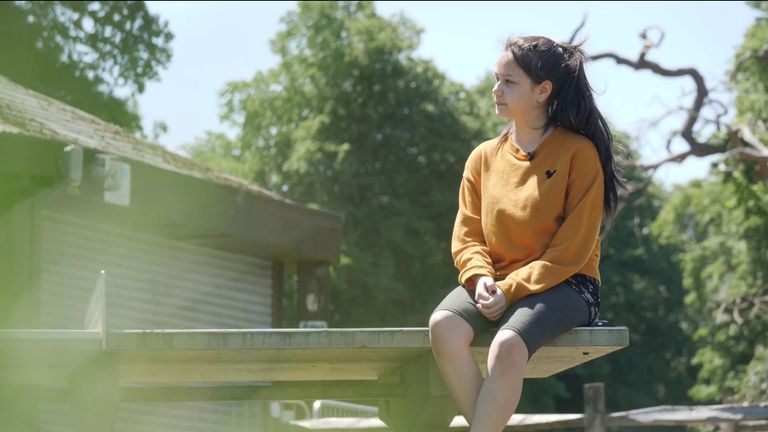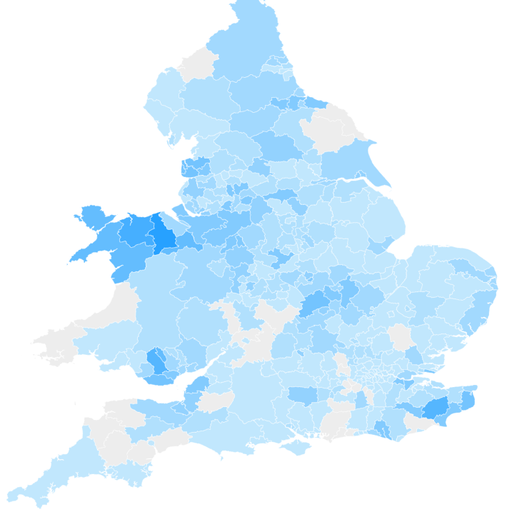Coronavirus: Plan shelved for all primary pupils to be back in school before summer holidays
The National Association of Head Teachers says if confirmed, "we're pleased to see the government will not force the impossible".
Tuesday 9 June 2020 15:02, UK
Plans for all pupils in England to return to primary school this term before the summer holidays are to be shelved by the government.
Education Secretary Gavin Williamson is due to give an update on the situation to MPs in the Commons later.
In England, some primary schoolchildren went back last week. Next week some secondary school children are returning.
Sky's political correspondent Joe Pike said: "There are signs today the government will drop their plans for all primary school children to go back to school before the end of term, before the summer holidays.
"This is a significant change - a big hit to a lot of parents, and therefore potentially a hit to the economy.
"The real problem seems to be the social distancing guidelines and these 'bubbles' of 15 pupils. So instead of having a class of 30 you could have a maximum of 15, and one teacher for every 15 pupils, and that is very difficult for schools.
"They now need to double the number of classes, they need to stagger arrivals, breaks and lunch times, and that seemingly is too difficult with just the six weeks left to the term.
"So these prescriptive rules that the Department for Education said schools had to abide by, are now going to be loosened later today."
Overnight, the National Association of Head Teachers (NAHT) said that if the plans were confirmed, it would be "pleased to see the government will not force the impossible".
The body previously said returning all pupils before the end of term would present "unsolvable practical barriers if the hierarchies of control are to be maintained".
It added: "Schools will continue to use their flexibilities intelligently to deliver the very best for all their pupils in their schools."
Rebecca Long-Bailey MP, shadow education secretary, also welcomed the move, if confirmed, adding the government has "completely failed to show leadership".
"For weeks headteachers, education unions, school staff and many parents have stated that the plans to open whole schools before the summer could compromise any safety measures a school had been able to implement with reduced pupil numbers," she said.
"The government must now give answers on what resources it will provide to adequately support home learning, from the provision of digital devices to all pupils who need one through to targeted online tuition."
It comes as pupils and teachers are to be tested for COVID-19 in the government's latest move to persuade parents to send children back to school.
Using voluntary swab tests, the study will assess the risk of coronavirus spreading among pre-school, primary and secondary school pupils and teachers.
Tests will initially be carried out in up to 100 schools across England, including 15 in London, targeting around 200 staff and children at each school, with results available over the summer.
The announcement of the plan, to be outlined in a Commons statement by Mr Williamson, comes as the cabinet meets to discuss further moves to ease the lockdown.
It also comes after Health Secretary Matt Hancock admitted that all schools may not be able to reopen fully even in September.
As Mr Williamson faces MPs, he is likely to be challenged on how many parents have heeded the government's advice to send their children back to primary school over the past week.
Speaking ahead of his statement on the schools testing programme, Mr Williamson said: "We know that being in school is vital for children's education and their well-being.
"Last week, primary schools began to welcome back some pupils and secondary schools will begin to do the same from 15 June, as part of our phased and cautious approach to getting children and young people back into the classroom.
"Studies like this will be invaluable as we continue moving forward with those plans, and help us assess the next steps for getting all children back into schools, nurseries and colleges with their friends and teachers."
The government insists the test to determine whether someone currently has the virus - involving a swab of the inside of the nose and the back of the throat using a long cotton bud - is completely safe.
The antibody test to determine whether someone has had the virus and developed antibodies requires a blood sample.
Trained paediatric staff will take all blood samples from children and trained medical professionals will visit schools to carry out the testing.
:: Listen to Sophy Ridge on Sunday on Apple Podcasts, Google Podcasts, Spotify, Spreaker
Mr Hancock said: "A critical pillar of our COVID-19 testing strategy is surveillance - testing samples of the population to gain a deeper understanding of the spread of COVID-19 - especially in those who may not have symptoms.
"This study will help us better understand how common asymptomatic and mild cases of COVID-19 are so that we can support parents, pupils and teachers and support staff, and inform our ongoing response to this new virus."
The cabinet is also expected to discuss the further easing of lockdown measures:
- Relaxing planning controls to allow pubs, restaurants and cafes to use outside areas
- Easing restrictions on weddings and funerals, including allowing outdoor weddings
- Allowing driving instructors to return to work
Ministers are also expected to consider future amendments to the controversial quarantine rules for people arriving in the UK, introduced this week, with "air bridges" exempting arrivals from popular holiday destinations.
The cabinet may also discuss calls from a growing number of Tory MPs - backed by some ministers - to reduce the two-metre social distancing rule to one and a half or even one metre, as it is in other European countries.
